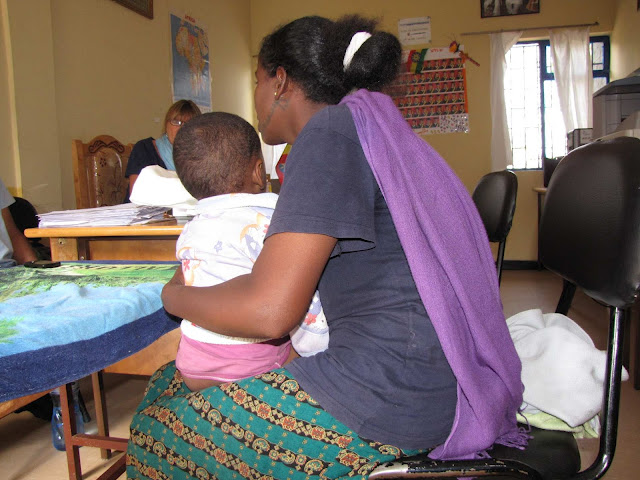23 May 2012
JUST LIKE OTHER MOTHERS,
Only much poorer.
http://internacional.elpais.com/internacional/2012/04/09/actualidad/1333968979_264431.html
This article in the newspaper "El País" refers to the famine in Sahel, from which we have selected the following paragraphs:
"In Arr, the local head doctor, Ba Saidou Amar, carries out an "appetite test" on Ibrahim Abdullay Sy, a 16 month old boy with severe malnutrition to see which is the best way to treat him. His mother, Kadia Mamadou Sy, doesn’t appear to be very concerned but the doctor is certainly indignant: "There are women who have maybe 300 or 400 cows and their children are undernourished, how can this be possible?", he asks himself whilst looking at the baby’s mother. His mother replies: "God is the one who should be taking care of the children".
"There are villages worth millions in cows where there are children suffering from malnutrition, why? This attitude must be changed", Doctor Amar insists.
In Mauritania, most parents don’t see their children’s malnutrition as something bad that needs treating, they see it as something misfortunate which they are not responsible for and which is best kept hidden from the outside world. If they do happen to ask for help from the village healer or the grandmother the lucky ones are given remedies which do not harm the child but in some cases they are given advice which can have harmful effects, such as stopping breastfeeding the child.
Back in Sélibaby, the capital of the Guidimakha region, Djeinaba Diallo, the director of the ACH headquarters gives a graphic description: "The mother of a severely undernourished little girl didn’t want to to take her to the centre. We went to her house and told her: 'If you don’t bring her in she will die'. The mother responded: 'Well, my father has died, my mother is no longer here, I have seven children and I am pregnant: if this one dies, she dies'".
We can’t possibly imagine what it’s like to be an African mother who sees her children die, nor can we put ourselves into the mental shoes of the mothers from the article in "El País". What appears to be indifference could be a mask to hide their deep pain, as if they are shielding themselves against the life they have to endure...
Unfortunately these types of articles reinforce the opinion of many people that African mothers "love their children less" or "they don’t love them like we love ours". Of course this helps to ease the conscience of those of us in the Western world, "they don’t love their children like we do", "they have lots of children", "Africa is overpopulated", "the best thing for African children is for them to be adoped by a Western family"...
From our own experience we would like to show the other side of the story.
There are mothers who, despite living in dreadful circumstances, try with all their might to give their children a present and a future. We have met some of these mothers during our selection process for the new intake of babies at the Abugida nursery school.
Stories of extreme poverty and adversity with a common denominator: the love for their children, regardless of how they may have been conceived in some cases (by no means are we trying to enter into a debate on whether children conceived by rape should be loved or not, we just want to show examples of true and unusual stories in the press).
H. is a blind mother with two daughters, the second as a result of being raped. H rocks her baby lovingly whilst she breastfeeds her. The girl’s father is a "good person" who took H into his home when she was widowed and left on the street with her other daughter. He took advantage and raped her. When he discovered H. was pregnant he threw her out onto the street.
A. was working as a housemaid and the son of the family raped her and infected her with HIV.
M. has the same story as A. Raped and infected with HIV, she had twins.
D. is the mother of A. who is 14 months. She was also raped. She is deaf.
The rest of the mothers are women with tremendous stories of poverty and solitude.
And they are all African, in this case Ethiopian. It’s time for us to stop portraying African mothers as mothers who love their children "less" than we do. We’ve had enough of the clichés that ease our conscience or make us feel superior. Let’s see if the press can look for some of the many other stories and real events happening every day.
Being poor doesn’t mean that you have less feelings, which is the impression we often seem to get from certain articles and opinions.
Subscribe to:
Post Comments (Atom)


No comments:
Post a Comment